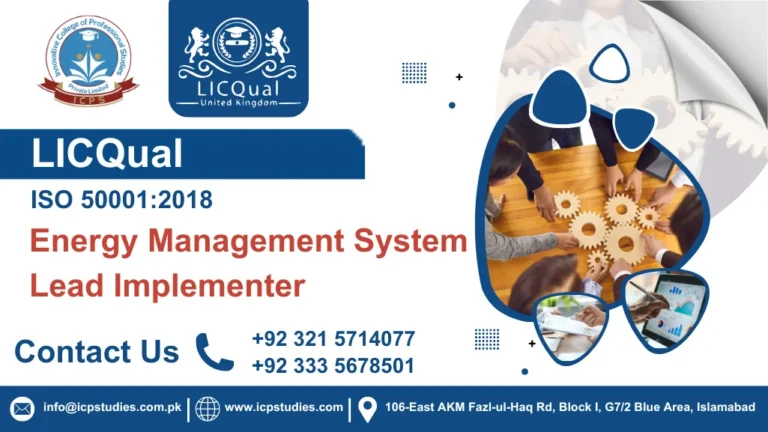In the ever-evolving landscape of education, the ability to effectively train and inspire others is crucial for driving success. The LICQual Certificate in Education Train the Trainer is a premier certification designed to equip professionals with the skills and knowledge to excel in delivering high-quality education and training.
Whether you’re looking to enhance your current role or transition into a training position, this course offers the expertise you need to make a significant impact.
The LICQual Certificate in Education Train the Trainer is a specialized program aimed at individuals who are passionate about education and training. This certification provides a robust framework for developing and delivering effective training programs in educational settings.
The course focuses on advanced training techniques, instructional design, and effective communication strategies, enabling participants to create engaging and impactful learning experiences.
The LICQual Certificate in Education Train the Trainer offers a comprehensive and practical approach to developing your training skills. By mastering advanced instructional techniques and gaining a recognized certification, you will be equipped to deliver impactful training programs that drive success and foster a culture of continuous learning.
Ready to elevate your training capabilities and advance your career? Explore the LICQual Certificate in Education Train the Trainer and unlock your potential as a leader in education and training.
For more information on enrollment and program details, contact us or visit our website. Invest in your professional growth and become a certified trainer who makes a lasting difference.
All About Certificate in Education Train the Trainer
Course Overview
- The LICQual Certificate in Education Train the Trainer is a distinguished program designed for professionals seeking to enhance their expertise in delivering high-quality education and training. This certification provides a thorough grounding in the principles of effective training, instructional design, and learner engagement, making it ideal for educators, trainers, and learning and development specialists.
- The course begins with a deep exploration of instructional theory and design. Participants will gain a comprehensive understanding of various educational frameworks and methodologies, including constructivist approaches, experiential learning, and adult learning principles. This foundational knowledge equips trainers with the ability to design training programs that are not only theoretically sound but also practical and relevant to diverse learning needs.
- Building on this foundation, the program delves into advanced training techniques and delivery methods. Participants will learn how to develop engaging and interactive training materials, incorporating multimedia and technology to enhance the learning experience. The course emphasizes the importance of creating a participatory learning environment where learners are actively involved and motivated. Key areas of focus include designing effective lesson plans, facilitating group discussions, and utilizing assessment tools to gauge learner progress and adjust training methods accordingly.
- A significant component of the course is dedicated to the practical application of training skills. Through a series of hands-on exercises, case studies, and simulations, participants will apply their theoretical knowledge to real-world scenarios. This practical approach helps to refine their training techniques and problem-solving abilities, preparing them to handle various challenges that may arise in training environments.
- The course also covers strategies for evaluating and improving training effectiveness. Participants will learn how to use feedback and assessment data to measure the impact of their training programs. This includes developing evaluation tools, analyzing results, and making data-driven improvements to enhance training outcomes. Emphasis is placed on continuous improvement and adapting training approaches based on learner needs and organizational goals.
- Leadership and coaching skills are integral to the program, enabling participants to mentor and guide others in their professional development. The course provides insights into effective leadership techniques, including giving constructive feedback, supporting team members, and fostering a culture of learning and growth. These skills are crucial for creating a positive and productive training environment.
- Upon successful completion of the course, participants will receive a recognized certification that validates their expertise and enhances their professional credibility. The LICQual Certificate in Education Train the Trainer positions individuals as qualified trainers capable of delivering high-impact education and training programs. This certification not only bolsters career prospects but also demonstrates a commitment to excellence in the field of education and training.
- In summary, the LICQual Certificate in Education Train the Trainer offers a comprehensive and practical approach to advancing training skills. It provides participants with the knowledge and tools needed to design and deliver effective training programs, assess their impact, and lead with confidence. By completing this certification, professionals will be well-equipped to make a significant contribution to the field of education and training, driving success and fostering a culture of continuous learning.
Study Units
- Introduction to Adult Learning Principles
- Training Needs Analysis and Curriculum Development
- Effective Training Techniques and Instructional Methods
- Designing Engaging Training Materials and Visual Aids
- Classroom Management and Facilitation Skills
- Assessment and Feedback Strategies for Trainers
- Adapting Training for Diverse Learners
- Reflective Practice and Professional Development for Trainers
To enroll in the LICQual Certificate in Education Train the Trainer, candidates should meet the following criteria:
- Relevant Professional Background: Applicants should have experience in education or training roles, such as teachers, trainers, or educational facilitators.
- Minimum Qualification: A Level 2 qualification in education, teaching, or a related field is typically required to ensure foundational knowledge of educational principles.
- Teaching Experience: While prior experience in training or teaching is advantageous, it is not mandatory. Candidates should demonstrate a commitment to educating and mentoring others.
- Strong Communication Skills: Effective verbal and written communication skills are essential for delivering engaging training sessions and facilitating discussions.
- Commitment to Professional Development: Candidates should have a willingness to engage in continuous learning and improvement in educational practices.
- Pre-Course Assessment: Some providers may require candidates to complete an assessment or interview to evaluate their suitability for the course.
- Understanding of Adult Learning Principles: Familiarity with adult learning theories and training methodologies is beneficial, although these concepts can be developed during the course.
These entry requirements ensure that participants are adequately prepared to take on training roles in education effectively. For specific inquiries or further details, prospective candidates are
The LICQual Certificate in Education Train the Trainer is ideal for a variety of professionals involved in education and training. Suitable candidates include:
- Teachers and Educators: Individuals looking to enhance their skills in training others and developing educational programs.
- Trainers and Facilitators: Those who conduct training sessions in corporate or educational settings and want to improve their methodologies.
- Educational Managers: Professionals in leadership roles who are responsible for overseeing training and development within educational institutions.
- Curriculum Developers: Individuals involved in designing educational materials and programs who wish to understand better how to train others in their implementation.
- Corporate Trainers: Professionals responsible for employee development who want to apply effective teaching strategies in workplace training.
- Support Staff: Individuals in roles that involve mentoring or supporting learners, seeking to deepen their understanding of training principles.
- Students and New Graduates: Those pursuing careers in education who want to gain practical skills in teaching and training.
Learning Outcome
Upon successful completion of the LICQual Certificate in Education Train the Trainer, participants will achieve the following learning outcomes:
1. Mastery of Instructional Design:
- Develop Comprehensive Training Programs: Participants will acquire the skills to design and develop detailed training programs that meet diverse learner needs and organizational goals. They will be able to create structured lesson plans, engaging materials, and interactive activities tailored to various educational contexts.
- Apply Educational Theories: Participants will be able to integrate key educational theories and methodologies into their training designs, including constructivist, experiential, and adult learning principles.
2. Advanced Training Delivery Techniques:
- Employ Effective Teaching Methods: Participants will learn advanced techniques for delivering training sessions that engage and motivate learners. They will be proficient in using a variety of instructional methods, including lectures, discussions, simulations, and multimedia tools.
- Facilitate Interactive Learning: Participants will develop the ability to create a participatory learning environment, encouraging active engagement and collaboration among learners.
3. Proficiency in Assessing Training Effectiveness:
- Evaluate Training Outcomes: Participants will gain expertise in using assessment tools and feedback mechanisms to measure the effectiveness of their training programs. They will be able to analyze evaluation data, identify areas for improvement, and refine their training approaches accordingly.
- Implement Continuous Improvement: Participants will learn strategies for making data-driven adjustments to their training programs, ensuring continuous enhancement and alignment with learner needs and organizational objectives.
4. Practical Application of Training Skills:
- Apply Knowledge to Real-World Scenarios: Through hands-on exercises, case studies, and simulations, participants will apply theoretical knowledge to practical situations, developing problem-solving skills and practical training techniques.
- Address Common Training Challenges: Participants will gain strategies for overcoming common challenges in training, such as managing diverse learner needs, handling resistance, and maintaining participant engagement.
5. Enhanced Communication and Facilitation Skills:
- Communicate Effectively: Participants will improve their verbal and written communication skills, enabling them to clearly articulate complex concepts and facilitate meaningful discussions.
- Lead Inclusive Discussions: Participants will learn techniques for leading sensitive and inclusive discussions, creating a supportive learning environment where all participants feel valued and heard.
6. Leadership and Coaching Competence:
- Guide and Mentor Others: Participants will develop leadership skills necessary for mentoring and supporting others in their professional development. They will learn to provide constructive feedback, coach trainees, and foster a culture of learning and growth.
- Promote Organizational Change: Participants will acquire the skills to lead and advocate for effective training initiatives that drive positive organizational change and enhance overall learning outcomes.
7. Capability to Design Customized Training Programs:
- Tailor Training Content: Participants will learn to customize training programs to address specific needs of different audiences, whether in educational settings, corporate environments, or other contexts.
- Align Training with Goals: Participants will ensure that their training programs align with broader organizational or educational goals, contributing to overall success and effectiveness.
8. Certification and Professional Recognition:
- Achieve Professional Credentialing: Participants will earn a recognized certification that validates their expertise and enhances their professional profile in the field of education and training.
- Advance Career Opportunities: The certification will open up new career opportunities and career advancement possibilities, positioning participants as leaders in the field of training and development.
FAQs about Certificate in Education Train the Trainer







